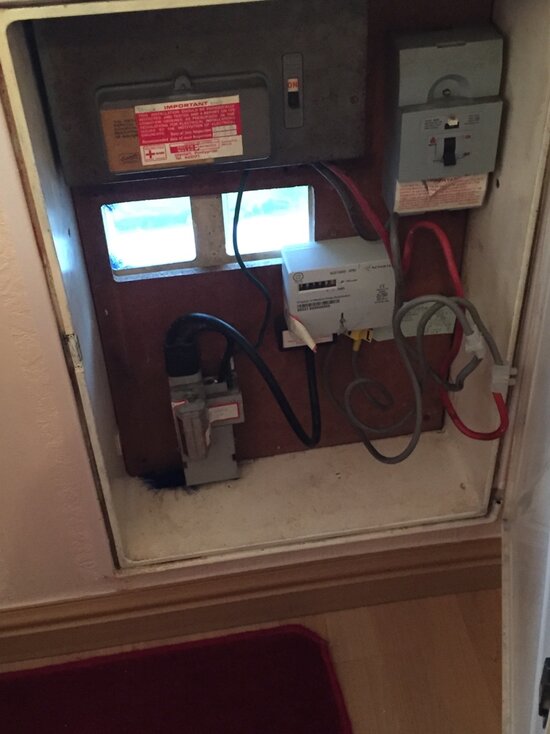S
sparc
Chilling out on late on Sunday afternoon when I got a call from a national home service organisation I'd never had contact with before. They asked me to attend an elderly couple who were without power - had been since noon, so they were now in the dark and cold, getting colder.
Got to house and found there was a new looking 30mA RCD after the meter, feeding a seventies vintage board with all MCBs. The RCD had tripped, taking out all the circuits. They had tried resetting just the RCD, but it wouldn't latch. So just to confirm that I flipped all the mcbs off and tried the RCD, which now latched on. Starting flipping on the mcbs one by one slowly and everything came back up. My next thought then was to let the place warm up a bit, give them some light and let them put the kettle on.
While that was going on I was digging into recent problems they'd had. The earth is TT and an old ELCB had burnt out a few weeks previously. The service company had sent someone, who replaced it with the new 30mA RCD. It had worked fine for a few weeks then tripped, taking out all the circuits.
I'd already decided I wasn't going to open the board at that point to look for which circuits were contributing to the earth leakage. Instead I wanted to leave them with the essentials for the night, then revisit in daylight. The RCD tripped again after about 15 minutes. I reset it again after disconnecting a few appliances and powering off two shower circuits and one circuit feeding the garage. It stayed on all night and is still okay 24 + hours later.
For next steps I'm thinking a) finding and fix the earth leakage/s and b) how to make the installation more resilient.
So - scene set - here are some questions I'd appreciate help on please :
In circumstance of a blown ELCB is a single 30mA RCD the best/only option? Would a 100mA S type be considered a backward step, in terms of 'By-the-Regs' protection? Yes, the 30mA gives all the circuits the required protection, but it in short term leaves the owners vulnerable to nuisance trips - not good for an elderly couple in winter. Wouldn't a 100mA S type be a better short term option - until a new board could be discussed? When the solution to a problem is considered 'ongoing' is there any defined period of time that this can take?
Got to house and found there was a new looking 30mA RCD after the meter, feeding a seventies vintage board with all MCBs. The RCD had tripped, taking out all the circuits. They had tried resetting just the RCD, but it wouldn't latch. So just to confirm that I flipped all the mcbs off and tried the RCD, which now latched on. Starting flipping on the mcbs one by one slowly and everything came back up. My next thought then was to let the place warm up a bit, give them some light and let them put the kettle on.
While that was going on I was digging into recent problems they'd had. The earth is TT and an old ELCB had burnt out a few weeks previously. The service company had sent someone, who replaced it with the new 30mA RCD. It had worked fine for a few weeks then tripped, taking out all the circuits.
I'd already decided I wasn't going to open the board at that point to look for which circuits were contributing to the earth leakage. Instead I wanted to leave them with the essentials for the night, then revisit in daylight. The RCD tripped again after about 15 minutes. I reset it again after disconnecting a few appliances and powering off two shower circuits and one circuit feeding the garage. It stayed on all night and is still okay 24 + hours later.
For next steps I'm thinking a) finding and fix the earth leakage/s and b) how to make the installation more resilient.
So - scene set - here are some questions I'd appreciate help on please :
In circumstance of a blown ELCB is a single 30mA RCD the best/only option? Would a 100mA S type be considered a backward step, in terms of 'By-the-Regs' protection? Yes, the 30mA gives all the circuits the required protection, but it in short term leaves the owners vulnerable to nuisance trips - not good for an elderly couple in winter. Wouldn't a 100mA S type be a better short term option - until a new board could be discussed? When the solution to a problem is considered 'ongoing' is there any defined period of time that this can take?











